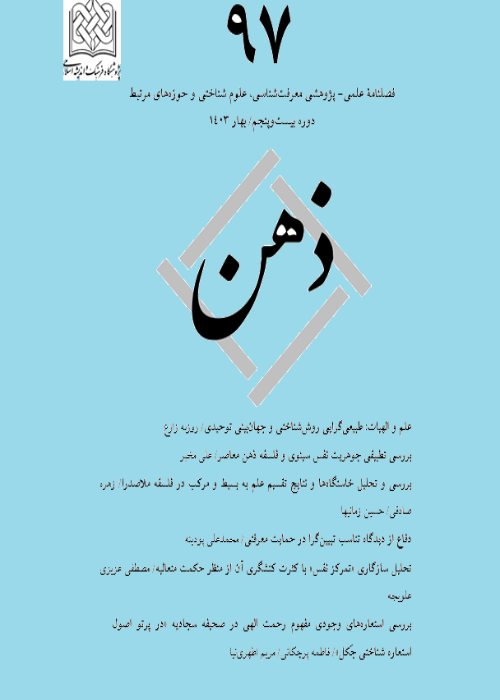Nature of categorization Predominant principles in logical categorization, family resemblances and prototype theory
Author(s):
Abstract:
One of the most basic and efficient abilities of human mind in recognizing phenomenon is categorization. It means putting similar phenomenon in general groups in order to ease recognition of their examples. Categorization could be investigated by three approaches. Aristotle or classical logic is the oldest method of categorization which is based on principles of subjectivism, necessity of common element in examples, maximum discrimination, simplification, determination of categories and same gradation. Second approach in categorization is based on Wittgensteins familial resemblance. Main principles of this method are as follows: objectivism instead of subjectivism, familial resemblance instead of common quiddity, fuzziness instead of maximum discrimination, negation of apparent category determination and grading examples instead of same grade. The most exquisite method of categorization is cognitive categorization that emphasizing the prototype element in process of categorization differs from the two previous methods in empiricism principles against objectivism and subjectivism also prototype against common quiddity.
Keywords:
Language:
Persian
Published:
Journal of Zehn, Volume:16 Issue: 2, 2015
Page:
53
magiran.com/p1511009
دانلود و مطالعه متن این مقاله با یکی از روشهای زیر امکان پذیر است:
اشتراک شخصی
با عضویت و پرداخت آنلاین حق اشتراک یکساله به مبلغ 1,390,000ريال میتوانید 70 عنوان مطلب دانلود کنید!
اشتراک سازمانی
به کتابخانه دانشگاه یا محل کار خود پیشنهاد کنید تا اشتراک سازمانی این پایگاه را برای دسترسی نامحدود همه کاربران به متن مطالب تهیه نمایند!
توجه!
- حق عضویت دریافتی صرف حمایت از نشریات عضو و نگهداری، تکمیل و توسعه مگیران میشود.
- پرداخت حق اشتراک و دانلود مقالات اجازه بازنشر آن در سایر رسانههای چاپی و دیجیتال را به کاربر نمیدهد.
In order to view content subscription is required
Personal subscription
Subscribe magiran.com for 70 € euros via PayPal and download 70 articles during a year.
Organization subscription
Please contact us to subscribe your university or library for unlimited access!


